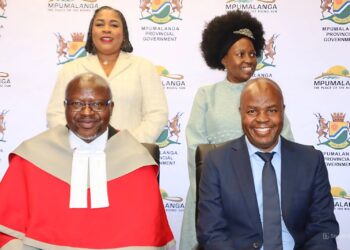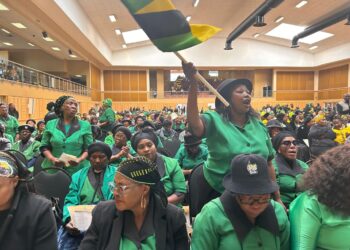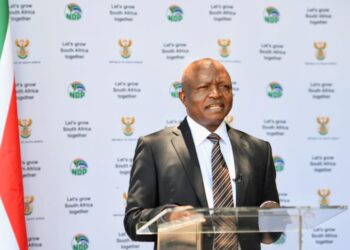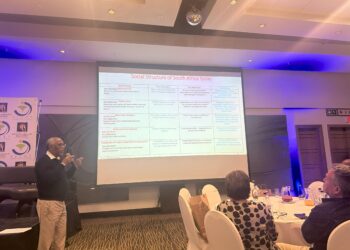
Motapo We’Zigidi
The debate on the nationalization of the South African Reserve Bank (SARB) simply refuses to go away, especially after the governing African National Congress (ANC) resolution to bring the central bank under full state ownership.
There is a simultaneous call for the nationalization of the SARB as well as the expansion of its mandate to include growth and employment as well as to remove private shareholders in its board. Finance minister Tito Mboweni, ANC head of economic policy Enoch Godongwana and SARB governor Lesetja Kganyago are amongst the most vocal influential people who oppose the nationalization of the bank.
Kganyago in June 2019 characterized the continuing call for the nationalization of the central bank as the arrival of the “barbarians at the gate of SARB”. Mboweni on his part re-ignited the fires when he twitted that the ANC had “adopted a wrong resolution,” which immediately attracted a rebuke by his party. Mboweni questioned what exactly would the nationalization achieve since SARB profits go to the National Revenue Fund. But he failed to argue cogently why the status quo should remain considering that SA appears to be sailing against the wind as the SARB is one of the few central banks that aren’t fully owned by their respective governments.
Jannie Rossouw of Wits’ School of Economic and Business Sciences once made a telling observation that the nationalisation of the SARB would actually “align the South African Reserve Bank’s ownership structure with the majority of central banks across the world.” He adds that the number of central banks with private shareholders have declined over the years since the nationalisations of the central banks in New Zealand, and more recently in Austria.
As quick background, history of modern central banking, anchored on the role of lender of last resort, traces its roots to the 17th-century with the establishment of the Bank of England and the Swedish Riksbank. Years before this, central banking was there “to finance expensive government operations.” At establishment, argues Sango Ntsaluba, “most central banks were privately owned, but this has changed over the past decade.” The trend of nationalising central banks began in the late 1930s as part of governments’ responses to the aftermath of the Great Depression, with the Reserve Bank of New Zealand being the first to be nationalised in 1935. India nationalised its central bank in 1969.
In their research paper dated 2013, authors Jannie Rossouw & Adele Breytenbach explain that the national government of New Zealand wanted to accept more responsibility for a wide range of functions in the economy. The nationalisation of the Danish central bank followed thereafter. It is important to note that almost all the central banks established after the WWII have had no shareholders since their inception. The more recent and important case study of central bank nationalization concerns the Oesterreichische Nationalbank (OeNB), or the National Bank of Austria, which was nationalised in June 2010 by transferring all shares not yet held by the Republic of Austria to the Government.
It is therefore disingenuous and also selfish of international organizations and advanced countries in Europe and elsewhere to criticise South African attempts to nationalize its central bank, as well as to expand its mandate. They went through the same journey and decided to bring their central banks under public control in order to attain specific political and economic mileage. The closest the ANC came to effecting processes for getting the SARB under full state control was in March 2017. However, the ANC inexplicably withdrew its motion literally within minutes before it was debated in Parliament.
Although the ANC caucus issued assuring statements to limit its damage, the Sunday Times newspaper reported that the then finance minister Nhlanhla Nene stopped the motion from being tabled in fear of yet another downgrade by ratings agency Moody’s. Unfortunately, this brought a fundamental question to the fore: In the South African democracy, do markets rank ahead of popular voice?
Reporting to the Minister of Finance, the South African Reserve Bank (SARB) is responsible for executing a public mandate (monetary policy) in the same way as the DTI (industrial policy), department of employment & labour (labour market policy), SAPS (public policing), DMRE (mineral and energy policies), etc. But one thing makes the SARB an anomaly in all these state institutions, the involvement of private individuals as shareholders (whatever this means) in a public entity. At present count the Bank has 2 million issued shares, held by the general public. There is no provision made to exclude foreign ownership as it is the case in other countries.
Nonetheless, shareholders include individuals and juristic persons. It is also specified that no group of shareholders can hold more than 10,000 shares. Rossouw argues that the rationale for this is to ensure that “no shareholder can exercise undue influence over the activities of the bank.” It is said that the shareholders have little or just very limited powers. He further adds that “being a shareholder isn’t very lucrative.”
What most people seem to deliberately ignore is that the shareholding in the SARB isn’t the same as owning Phuthuma Nathi (MTN) or Inzalo (Sasol) shares which are essentially private institutions, and these shares don’t impact on equity of these companies. Phuthuma Nathi and Inzalo shares are just low class stock that doesn’t give the holders any decision-making powers. Hence my objection to these so-called empowerment shares. Therefore, when dealing with the SARB shares it is necessary to look at influence rather than the monetary value these shares provide.
This is not an outcome of boredom that so many people would want to hold on to the SARB shares. In any way, why would anyone want to own shares in the SARB if the assertion that they not lucrative is to be believed? Or put differently, why private individuals were allowed to have a stake in a public institution in the first place? The response that always comes is that it is necessary for ‘transparency’ and ‘independence’. That is utter nonsense designed to mislead the public. The National Prosecuting Authority (NPA), Office of the Public Protector and others are independent state institutions but they have no private shareholders. These institutions promote transparency through reporting to responsible bodies of parliament…
In any way, why would anyone want to own shares in the SARB if the assertion that they not lucrative is to be believed? Or put differently, why private individuals were allowed to have a stake in a public institution in the first place? The response that always comes is that it is necessary for ‘transparency’ and ‘independence’. That is utter nonsense designed to mislead the public. The National Prosecuting Authority (NPA), Office of the Public Protector and others are independent state institutions but they have no private shareholders. These institutions promote transparency through reporting to responsible bodies of parliament.
Furthermore, it is not about the amount of shares individuals own in the SARB. Tito Mboweni has on previous occasions tried to demonstrate how little dividend he gets from his x number of shares he owns. That is not the point. What he fails to address is the fact that these 700 plus individuals (among them Germans and foreign nationals, 8.2%) who are disguised as shareholders could be planted to ensure that the SARB follows a specific direction.
One economics professor Raymond Parsons from North-West University also owns shares in the bank. Parsons was later appointed to the non-executive board of the Reserve Bank by the then finance minister, Trevor Manuel. When asked what his role was, he responded that non-executive directors “have no say in monetary policy, they serve a valuable corporate oversight role over the bank’s affairs and act in a general corporate governance role.” However, Parsons says absolutely nothing their proximity to those who make monetary policy.
Whose mandates do those individuals carry in the passages of the Reserve Bank? Why would anyone in Norway, Germany or England would want to own useless shares in an African public institution? President Ramaphosa explained in 2019, “There are some six countries in the world that have external shareholders in the bank, and we are one of them.” He already addressed this point by saying that SARB shares should be owned by South Africans. Eyes pop already! A sample of shareholders done by the M&G shows that shareholders are investment funds, farmers unions such as AgriSA, Hertzogbrug Farmers Union and the Free State Agriculture Union as well as SA’s three biggest banks (i.e. First Rand Bank, Standard Bank and ABSA). The SARB is supposed to regulate banks. Why would banks be shareholders in a regulatory authority?
As things stand, the financial sector is way too powerful and protectionist in this agenda. This implies that these banks whisper sweet-nothings to the registrar of banks due to the power they hold in the South African economy in general. Professor Thandika Mkandawire of the London School of Economics is of the view that South Africa’s financial sector is way too powerful, so it is easier to understand where it draws its power from. The financial sector is a raging bull that must be tamed before it collapses the country’s economy. However, nobody is prepared to do this because of the obvious reasons.
During the peak of the ‘Zuma wars’ in our national politics, the Competition Commission in 2017 announced that local and international banks such as ABSA (Barclays), BNP Paribas, Citibank and JP Morgan were involved in the fixing of the Rand. The SA currency has never recovered from this manipulation. For example, Business Insider reports that the Big Mac Index undervalued the rand by 62% against the dollar – hence the world’s cheapest currency. As a result, Citigroup paid a paltry penalty of almost R70m ($5.4m) to settle the case and declare that it would “make witnesses available to help prosecute other banks.” Maria Ramos who was the head of Barclays Africa (or ABSA) could only apologize.
What is interesting is that SARB did not take action against the culprits such as suspending their licenses until the probe was finished, which never even happened. In 2019, Mboweni was asked in parliament why the Treasury nor the SARB did not conduct their own independent investigations on the case. He responded, “neither National Treasury nor the South African Reserve Bank had evidence of currency manipulation by South Africa’s banks and, therefore, did not investigate it.” This means that both institutions ignored the Competition Commission findings, a strange occurrence indeed because the antitrust body is a state institution. No one was punished severely for manipulating the Rand at the end of the day.
Absa was the winner. This is not surprising considering that ABSA is both a referee and player in the South African financial system. And after she stepped down as CEO of Absa retired in 2019, Mboweni later appointed her as a member of the interim PIC board to chagrin of the Economic Freedom Fighters (EFF). Ramos is still part of the PIC nevertheless. And former SARB executive Daniel Mminele replaced Ramos at ABSA in a process which completed a process that resembles inbreeding of a highest order.
The SARB is one of the remaining privately owned central banks in the world, together with those of Belgium, Greece, Japan, Switzerland and Turkey. The South African government has zero shareholding in the central bank. This means that South Africa lags behind other countries who wholly own their central banks. But Rossouw points out that although this is the case, an eclectic number of central banks with private shareholders still remain. Rossouw adds, there were however no major policy, system or financial changes followed in Austria after nationalisation. However, that is should not be a reason for maintaining the current situation.
Even though protectors of the SARB independence bravely take knocks while “defending” the Bank and the country’s financial system, they forget one thing: an untransformed financial system will undermine broader economic transformation goals, as seen in mining and other industries. No successful capitalism will ever function without money. Therefore, money is like blood to capitalism. As a regulator of much of the financial system (including banking supervision), the SARB is a good start in efforts to drive change in South Africa.
Different scholars and commentators warn that the nationalization process could be complicated by, amongst others, some international interests that are anchored in international treaties. One German Michael Duerr boastfully declared that his SARB shares are protected by a treaty until 2034, and that are worth far more than prevailing prices. What this means is that those who oppose the nationalization of the SARB are merely ramping up support for a compensation mechanism of the shareholders who insist that they want to be bought out by government.
Siya yi banga le economy!






















